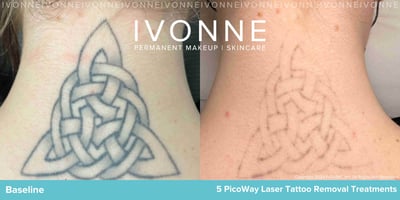PicoWay is a popular laser treatment that is used to address a variety of skin conditions,...
How to Fix Bad Laser Tattoo Removal
Tattoos are a form of self-expression, but sometimes they are regretted later on. Laser tattoo removal is a popular option for getting rid of unwanted tattoos, but it can go wrong. If you've had a bad experience with laser tattoo removal, don't despair. There are ways to fix it.
What Causes Bad Laser Tattoo Removal?
Bad laser tattoo removal can be caused by a number of factors, including:
- Inexperienced technicians
- Inadequate laser equipment
- Using the wrong laser for your skin type
- Not following proper aftercare instructions

How to Fix It
If you've had a bad experience with laser tattoo removal, there are a few things you can do to fix it:
- Consult with an authorized provider who specializes in laser tattoo removal. They will be able to assess the damage and recommend the best course of action.
- Consider a different type of laser. Different lasers target different colours of ink, so if the laser used on you wasn't effective, a different one might be.
- Be patient. Laser tattoo removal is a gradual process and it can take several sessions (and sometimes up to 12 weeks in between) to fully remove a tattoo.
Prevention
To prevent bad laser tattoo removal in the first place, it's important to:
- Choose a reputable and experienced laser technician
- Ask to see the laser equipment before your treatment
- Make sure the technician is using the appropriate laser for your skin type
- Follow all aftercare instructions
Prevention
To prevent bad laser tattoo removal in the first place, it's important to:
- Choose a reputable and experienced technician
- Ask to see the laser equipment before your treatment
- Make sure the technician is using the appropriate laser for your skin type
- Follow all aftercare instructions
Choosing a reputable and experienced technician is essential in preventing bad laser tattoo removal. Research different laser tattoo removal clinics and read reviews to find one that has a good reputation and experienced technicians.
Before your treatment, ask to see the laser equipment. This will allow you to see if the equipment is adequate and in good working condition. It also gives you an opportunity to ask the technician any questions you may have.
Make sure the technician is using the appropriate laser for your skin type. This is something that should be discussed with the technician before the treatment begins. They should be able to recommend the best laser for your particular situation.
Lastly, it is important to follow all aftercare instructions. These instructions are given to you by the technician and are meant to be followed closely to ensure proper healing and to prevent any complications from arising. This is crucial step after the treatment, to ensure the best results and to avoid any unwanted side effects.
Other options
If the bad laser tattoo removal is severe, or if you want to avoid further laser treatments, there are alternative options to consider such as:
- Tattoo cover-up: This is when a new tattoo is applied over the old one, effectively hiding it.
- Excision: This is when the tattooed skin is surgically removed and the wound is closed with stitches.
- Dermabrasion: This is a type of sanding down the top layer of skin to remove the tattoo.
It is important to consult with a professional before deciding on an alternative option, as they will be able to assess the damage and recommend the best course of action for your particular situation.
Conclusion
Bad laser tattoo removal can be a frustrating and disappointing experience, but it's not the end of the road. By consulting with a professional, considering different laser options, being patient and following proper aftercare instructions, you can fix the damage and achieve the results you want. It's also important to be proactive in preventing bad laser tattoo removal by choosing a reputable and experienced technician and making sure the appropriate laser is used for your skin type. And remember that there are also alternative options available for severe cases.


